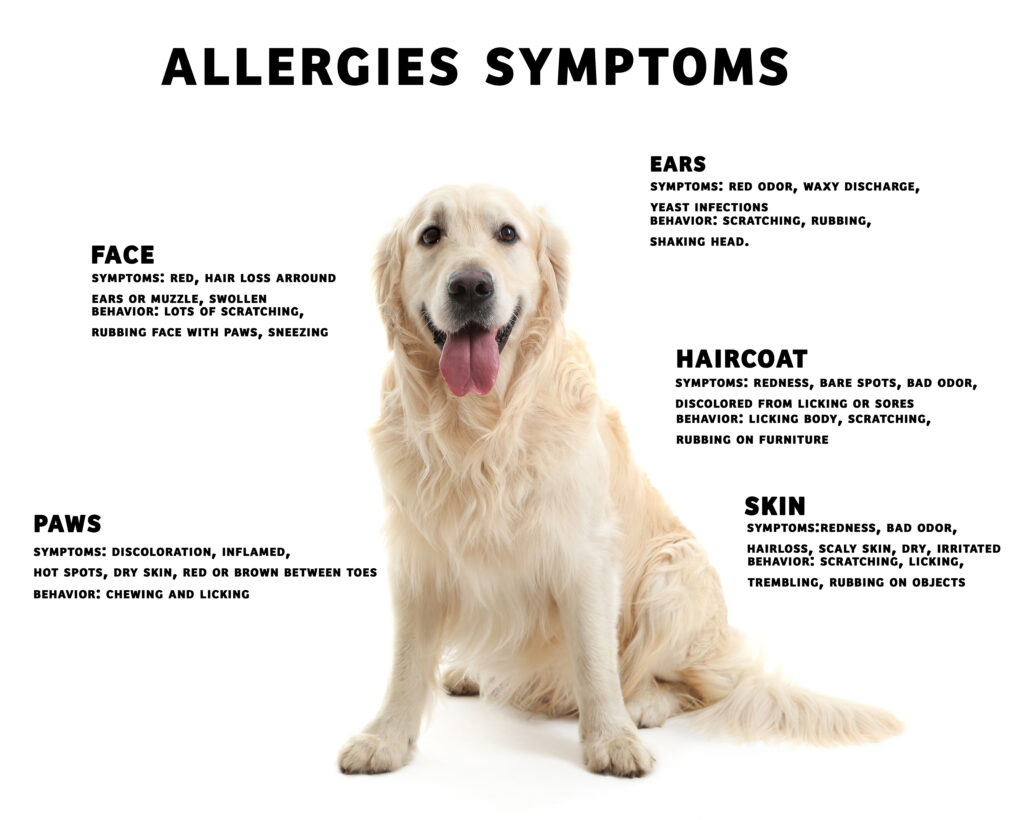
Pet Allergies 101
You Need to Know These Allergy Symptoms in Pets
Just like people, pets can suffer from allergies. Does your pet have allergies? How can you tell if your pet has allergies? We help you break down if your pet has allergies, how to diagnose allergy sources, and how to treat your pet’s allergies. If you want to learn more about this important topic, you need to read this blog post.
What Causes Allergies?
The three common causes of pet allergies are listed below:
- Skin Allergies – Skin allergies are often caused by fleas. This is known as flea allergy dermatitis.
- Food Allergies – While some food allergy symptoms are similar to signs of skin allergies, the cause is quite different. In this case, the animal is reacting to a certain food. This could be a particular protein, grains, etc.
- Environmental Allergies – This could be caused by pollen, mold, and/or dust. Once again, the symptoms are similar to the symptoms that are triggered by skin allergies.
Allergy Symptoms
We’ve talked about what causes allergies. Now let’s discuss how to tell if your pet has allergies. Here are some of the most common symptoms in pet allergies that can help you determine if your own precious pet is suffering from allergies.

Skin Issues
Allergies that cause skin problems can be quite uncomfortable for your poor fur baby. Symptoms may include:
- Excessive scratching
- Biting
- Inflamed skin
- Licking paws
- Licking anus
- Rubbing against furniture
- Open sores
- Scabs
- Excessive shedding/hair loss
- Dandruff
- Scooting
All that biting, scratching, and licking is your pet’s attempt to get rid of uncomfortable symptoms. But allowing your pet to continue these attempts will only end up harming your furry friend. For example, excessive biting and scratching could lead to secondary skin infections. This would complicate the treatment protocol by creating additional problems that require added treatments.
Respiratory Issues
When it comes to pet allergies, you are far more likely to spot skin issues than respiratory problems. But that doesn’t mean they are nonexistent.
Despite being less common, it’s still smart to look out for the following symptoms:
- Sneezing
- Watery eyes
- Runny nose
- Coughing
- Snoring
- Wheezing
- Difficulty breathing
That last symptom requires an immediate response. If you notice your pet struggling to breathe, get to the veterinarian right away. Otherwise, the end result could be fatal to your pet.
Ear Issues
Allergies can irritate a pet’s ears. This is seen by the following symptoms:
- Ear scratching
- Head shaking
- Losing hair in the ear area
- Ear discharge
- Red ears
- Ear wax
If left untreated, these symptoms could lead to an ear infection. That’s why it’s best to address ear issues before they turn into more serious problems.
Certain dog breeds are especially prone to ear infections. Examples include:
- Basset Hounds
- Cocker Spaniels
- Old English Sheepdogs
- Poodles
- Pit Bulls
- Shar-Peis
Digestive Distress
If your pet is having trouble digesting meals, the problem might be a food allergy. Signs to look out for include:
- Vomiting
- Diarrhea
- Gas
- Scooting
- Red anus
How to Resolve Your Pet’s Allergies
If your pet is struggling with any of the symptoms listed in this article, you are probably desperate to provide relief. But how?
The first step is to determine the source of the problem. You can do that by working with a veterinarian you wholeheartedly trust. You must be confident that this person has your pet’s best interest in mind.
After your pet has been diagnosed, the next step is to come up with a plan to reduce or eliminate allergy symptoms. While we don’t know what your veterinarian will choose to do, we can list some possible allergy-fighting strategies.
Those strategies include:
- Eliminating troublesome ingredients from your pet’s diet.
- Treating your pet for fleas and removing them from your home.
- Prescribing conventional medications for allergies.
- Bathing your pet frequently and using a hypoallergenic shampoo.
- Wiping your pets paws and face with pet wipes
- Washing the bedding and vacuuming the house often.
- Running air filters.
- Keeping windows and doors closed.
- Replacing carpet with tile.
Taking the Natural Route
Maybe you are concerned about giving your pet conventional drugs. In that case, you should look for a holistic veterinarian who understands how to use natural remedies for allergies.
These remedies might include:
- Giving your pet colostrum.
- Feeding your pet cooked or dehydrated mushrooms.
- Giving your pet supplements made of natural ingredients.
- Rinsing your pet’s paws with apple cider vinegar.
- Giving your pet an oat bath.
- Spraying your pet’s skin with a mixture of baking soda and water.
- Using homeopathic remedies created specifically for pets with allergies.
When trying to determine which natural remedies to use, always consult your holistic veterinarian.
In Conclusion
When you know the symptoms to look out for, you will know when your pet is suffering from allergies. And that means you will be aware of your pet’s need for relief. Your beloved fur baby will be grateful for that!
About the Author:
Savanna Westwood
Savanna Westwood is the Owner and Founder of The Savvy Sitter, Pet Sitting and Dog Walking, LLC. She has grown up with animals all her life and enjoys spending time with them. Savanna has lived in the Winter Garden and Windermere Area for over 30 years. When she is not taking care of Fur Friends, one can find her reading, practicing archery, riding, and devising ways to provide additional and excellent services to clients. Savanna is a Certified Professional Pet Sitter with Pet Sitter International's CPPS certification and also holds certification in Pet First Aid and CPCR for Pet-Care Professionals.

